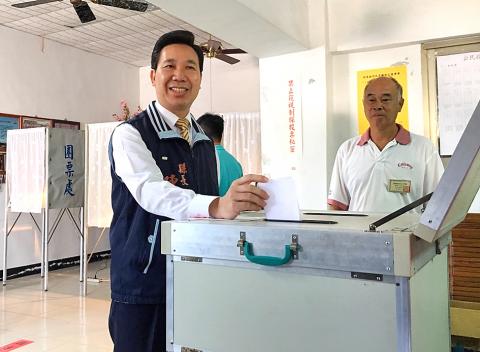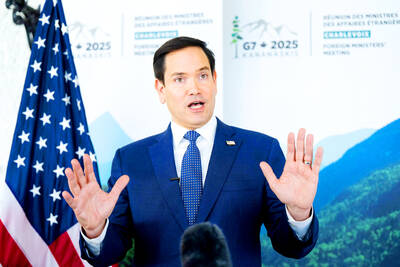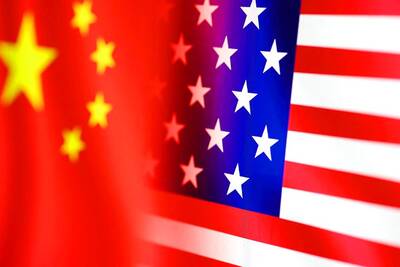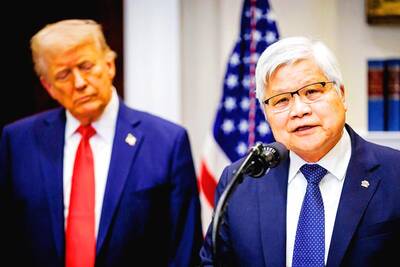Kinmen County residents yesterday voted against legalizing gambling in the outlying county.
The referendum question, formulated by Chinese Nationalist Party (KMT) Kinmen County Councilor Tsai Chun-sheng (蔡春生), asked Kinmen residents whether they supported establishing an “international holiday resort complex” with 5 percent of its space designated for gambling.
Results released by the Kinmen County Election Commission at about 6pm yesterday showed that turnout was 24.17 percent among 114,426 eligible voters, with 24,368, or 90.01 percent, voting “No,” and 2,705, or 9.99 percent, voting “Yes.”

Photo: Wu Cheng-ting, Taipei Times
The polls were open from 8am until 4pm.
An additional 589 null votes were also cast, the commission said.
Kinmen County Commissioner Chen Fu-hai (陳福海) and KMT Legislator Yang Chen-wu (楊鎮浯), whose constituency is in Kinmen, both cast a “No” vote.
Speaking to reporters after casting his ballot, Chen said that the question of whether to build casinos in Kinmen showed that the county’s growth had reached a bottleneck.
He called on governments on both sides of the Taiwan Strait to place more emphasis on Kinmen’s development.
“Gambling is not the only option for Kinmen,” he said, adding that the county, as the nation’s outpost, has an abundance of relics dating back to the Chinese Civil War and traditional Minnan-style buildings and rustic attractions.
Yang said he was “glad” about the outcome, which demonstrated the residents’ “collective wisdom.”
“It showed that Kinmen folks were thinking about development in the long term, instead of being shortsighted and allowing themselves to be lured by profits close at hand,” Yang said.
Alliance Against the Legalization of Gambling executive director Ho Tsung-hsun (何宗勳) said that there were three contributing factors to the outcome.
First, civic awareness in Kinmen has grown in recent years and many residents that are not members of groups opposed to gambling have been campaigning against casinos by making and distributing promotional tools, Ho said.
Second, Kinmen’s demography is mostly comprised of civil servants, giving it a more conservative social setting that is unfavorable to gambling, he said.
China, which has been unequivocal in opposing gambling, also played a role in the outcome, he said.
The Xiamen Daily on the eve of the referendum published an opinion piece by the Chinese government criticizing gambling, which could have had an effect on voters, he said.
In addition, many young Kinmen residents are worried about casinos driving up house prices, Ho said.
The referendum outcome indicates that neither the pan-green nor the pan-blue camp welcomes gambling, Ho said, calling on the Democratic Progressive Party administration to abolish Article 10-2 of the Offshore Islands Development Act (離島建設條例), which governs the establishment of casinos, to free outlying islands from the “threat” of such referendums.
Additional reporting by Sean Lin

‘CROWN JEWEL’: Washington ‘can delay and deter’ Chinese President Xi Jinping’s plans for Taiwan, but it is ‘a very delicate situation there,’ the secretary of state said US President Donald Trump is opposed to any change to Taiwan’s “status quo” by force or extortion and would maintain that policy, US Secretary of State Marco Rubio told the Hugh Hewitt Show host on Wednesday. The US’ policy is to maintain Taiwan’s “status quo” and to oppose any changes in the situation by force or extortion, Rubio said. Hewitt asked Rubio about the significance of Trump earlier this month speaking with Taiwan Semiconductor Manufacturing Co (台積電) chairman C.C. Wei (魏哲家) at the White House, a meeting that Hewitt described as a “big deal.” Asked whether the meeting was an indication of the

‘RELATIVELY STRONG LANGUAGE’: An expert said the state department has not softened its language on China and was ‘probably a little more Taiwan supportive’ China’s latest drills near Taiwan on Monday were “brazen and irresponsible threats,” a US Department of State spokesperson said on Tuesday, while reiterating Washington’s decades-long support of Taipei. “China cannot credibly claim to be a ‘force for stability in a turbulent world’ while issuing brazen and irresponsible threats toward Taiwan,” the unnamed spokesperson said in an e-mailed response to media queries. Washington’s enduring commitment to Taiwan will continue as it has for 45 years and the US “will continue to support Taiwan in the face of China’s military, economic, informational and diplomatic pressure campaign,” the e-mail said. “Alongside our international partners, we firmly

KAOHSIUNG CEREMONY: The contract chipmaker is planning to build 5 fabs in the southern city to gradually expand its 2-nanometer chip capacity Taiwan Semiconductor Manufacturing Co (TSMC, 台積電), the world’s biggest contract chipmaker, yesterday confirmed that it plans to hold a ceremony on March 31 to unveil a capacity expansion plan for its most advanced 2-nanometer chips in Kaohsiung, demonstrating its commitment to further investment at home. The ceremony is to be hosted by TSMC cochief operating officer Y.P. Chyn (秦永沛). It did not disclose whether Premier Cho Jung-tai (卓榮泰) and high-ranking government officials would attend the ceremony. More details are to be released next week, it said. The chipmaker’s latest move came after its announcement earlier this month of an additional US$100 billion

Authorities yesterday elaborated on the rules governing Employment Gold Cards after a US cardholder was barred from entering Taiwan for six years after working without a permit during a 2023 visit. American YouTuber LeLe Farley was barred after already being approved for an Employment Gold Card, he said in a video published on his channel on Saturday. Farley, who has more than 420,000 subscribers on his YouTube channel, was approved for his Gold Card last month, but was told at a check-in counter at the Los Angeles International Airport that he could not enter Taiwan. That was because he previously participated in two